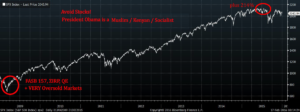Mixing politics and investing is a horrible idea. What do you do if the person in charge of your hard- earned money is a rabid partisan?
According to The Investment News a financial advisor ran into some regulatory issues. The advisor in question was accused of calling President Obama “evil.” He was also found to be offering new clients a $100 coupon for the purchase of a new firearm. You really can’t make this stuff up.
The point of this discussion is not whether the advisor broke any rules or his individual right to free speech. The question is: Would you want someone with such intransient, hell-bent viewpoints managing your money? The idea of investing is to achieve your financial goals with a portfolio that balances the appropriate risk level given the client’s time frame using unbiased decision-making to garner the needed returns. Managing client behavior and expectations are priority over packing heat with a $100 discounted assault weapon.
My colleague, Barry Ritholtz has stated this time and time again:
“We have seen this movie before, and it doesn’t end well for those who tie a political narrative to an investing thesis. Then there’s the separate issue of giving presidents way too much credit for good economies and strong markets and assigning way too much blame for the bad.”
Barry was mainly speaking about individuals voting preferences co-mingled with their portfolio, not their financial advisors. Let’s break down why following the advice of a rabid partisan advisor could lead to big trouble:
- Investment decisions might be based on narratives or stories, not empirical data. This would be like choosing a heart surgeon because you liked the car he drives or root for the same baseball team.
- Mixing emotions with investing usually turns out pretty bad. Since religion and politics tend to score very high on this scale, it is probably not the best idea to mix them with your money.
- Confusing cause and effect can lead to big time problems. Involving presidential politics in your investment decisions is very similar to relying on the price of yak milk in Uzbekistan for market guidance. Just because the price of the yak’s milk goes up when markets rally, does not mean that one has anything to do with the other. At least you will have your gun to shoot the yak if things don’t go well, so all is not lost.

This chart from Bloomberg shows the results of following this type of partisan advice over the past years. It is not very pretty.
I could care less who you or anyone else votes for. I certainly believe in free speech no matter how ridiculous it may be. What I object to are advisors letting their political opinions affect their investment decisions.
The financial services industry is filled with enough conflicts of interest with the much too prevalent broker-run, sales-based models. Clients have enough to overcome; their advisor’s political opinions should not be added to the list.
Finally, this particular advisor was quoted as saying, “I still think he [President Obama] is a communist and an evil man.” Again, he has every right to say this. It is after all still a free country.
My problem is the statement is inaccurate. Read about Chairman Mao in Communist China or Josef Stalin in the old U.S.S.R. Deaths of tens of millions of innocents are the results of Communist Dictatorships, but evil hasn’t been limited to Communists, only. Fascist, Adolph Hitler slaughtered 12 million innocents during the Holocaust. This is the pure definition of evil.
Unless I missed the memo, I don’t think we have seen anything like this in our country that remotely matches an accurate description of those two terms.
Quite frankly, how could anyone in good conscious accuse the president of being a Communist during one of the greatest bull markets in history during his two terms? I am certainly not saying he was responsible for this rally but it is hard to take this accusation seriously when the ultimate capitalistic indicator went parabolic under his presidency. I am not a big Obama supporter, but I at least try to be fair.
When advisors speak or act like this publicly, or use these types of viewpoints to solicit new business, things can become problematic. The chances of getting sound, unemotional, evidence- based investment advice are most likely not very high.
Keep this in mind when choosing an investment advisor or making your own decisions regarding your money. Ignore this advice at your own peril. There will be plenty of opportunities to do some really stupid stuff with your portfolio during the upcoming 2016 election.
This campaign could end up being one of the nastiest on record. That would really be saying something when you look back on our previous vicious contests.
Don’t fall into this trap. Separate your politics from your money. If you do, you just might have enough funds left for some politically motivated travel instead of portfolio allocation.
I have a more fiscally sound solution for your political leanings. Why not attend the red or blue balloon drops, more commonly known as nominating conventions?
Put on your silly hat and go to town! You can whoop it up all you want with your compadres and have a grand old time. The price of the plane ticket will be a heck of a lot cheaper than the damage partisan political opinions will do to your portfolio.





